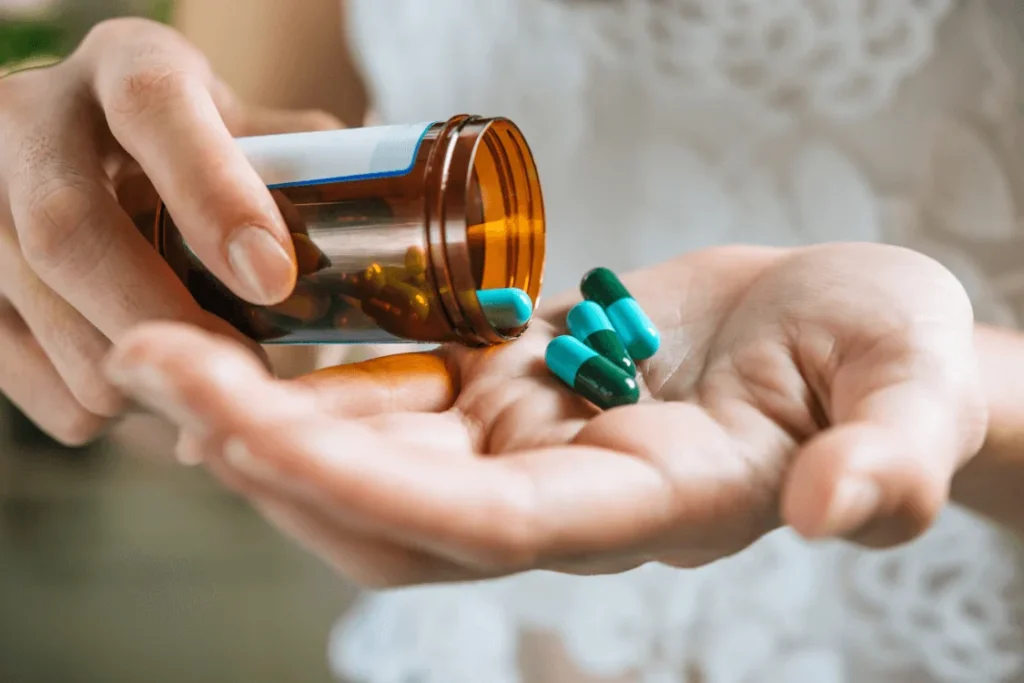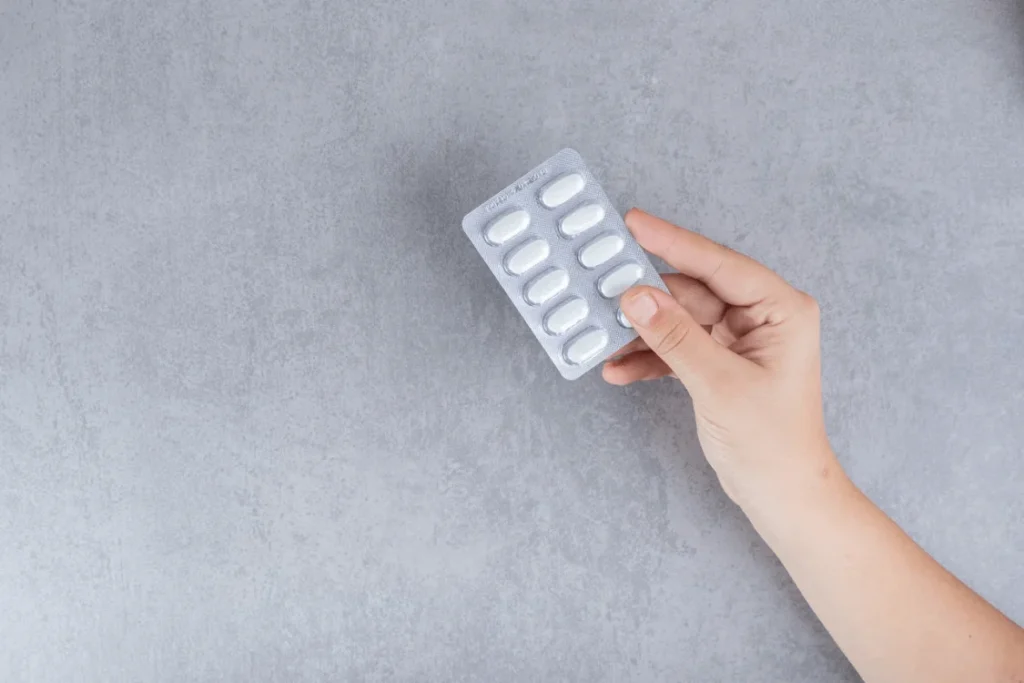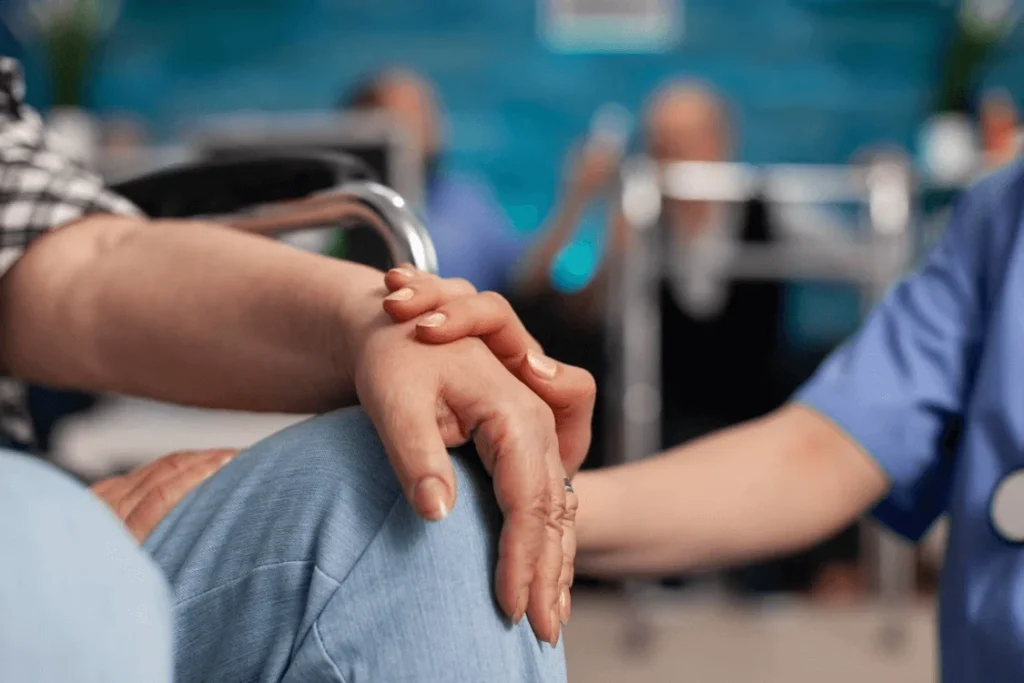
Medication for Prescription Drug Addiction: Effective Treatment Options and Considerations
Medication for prescription drug addiction plays an important role in easing withdrawal symptoms and supporting long-term recovery. For many people, physical dependence makes it difficult to stop drug use on their own. Medications can help manage cravings, reduce relapse risk, and allow space to begin therapy and other forms of care.
If you’re looking for how to overcome prescription drug addiction, you’re in the right place. Read on as our experts explore how medication works, what options are available, and how it fits into a comprehensive treatment plan.
Understanding Prescription Drug Addiction
Prescription drug addiction can develop through repeated prescription drug use of medications intended to treat pain, treat anxiety, or other conditions. This addiction affects how you think, behave, and function.
Why Do People Use Prescription Drugs and Become Addicted?
Many people begin using prescription medicines to manage physical or emotional symptoms. Prescription painkillers, sedatives, and prescription stimulant medications are prescribed to reduce discomfort, calm anxiety, or improve focus.
When people misuse prescription drugs, these medications can trigger changes in the brain’s reward system. Tolerance may build, leading to a need for higher doses to get the same effect. This cycle can create physical dependence and reinforce repeated use, even when problems start to appear in your daily life.
Signs and Symptoms of Prescription Drug Addiction
Signs of misuse may include changes in mood, sleep, and concentration. You may notice increased drowsiness, restlessness, or bursts of energy depending on the type of prescription medication involved. Physical symptoms might involve nausea, constipation, or slowed breathing in the case of a prescription opioid.
You might also find yourself thinking about the drug frequently or taking it at times when it’s not needed. These signs may affect your relationships, responsibilities, and overall health.
Some of the Most Commonly Abused Prescription Drugs
Prescription drugs that are usually associated with addiction fall into three main groups:
Prescription opioids, benzodiazepines, and stimulants.
Opioids such as oxycodone and hydrocodone are used to treat pain, but can cause dependence when misused. In addition, benzodiazepines like diazepam or alprazolam are used to treat anxiety and sleep issues, but can also lead to sedation and memory problems when taken improperly.
Stimulants such as amphetamine or methylphenidate are prescribed for attention disorders but may be misused for their energizing effects.

Common Medications for Prescription Drug Addiction
Using the right medication for prescription drug addiction can ease withdrawal symptoms, reduce cravings, and support recovery by managing the physical and mental health challenges that often come with treatment.
Methadone and Buprenorphine
Methadone and buprenorphine are used to treat opioid addiction by acting on the same receptors in the brain without producing the same level of euphoria. Methadone is a full opioid agonist, which helps reduce withdrawal and cravings.
Buprenorphine is a partial agonist, limiting its effects and lowering the risk of misuse. These medications help stabilize your system, which makes it easier to continue care and therapy without untreated symptoms interfering.
Long-Acting Benzodiazepine
For those dependent on short-acting benzodiazepines, long-acting options like diazepam or clonazepam may be prescribed. These are prescription medications that stay longer in your system, which can support a smoother taper.
This approach can reduce rebound anxiety, seizures, or other withdrawal symptoms, particularly when supervised as part of a formal treatment plan.
Bupropion, Modafinil, and Topiramate
Bupropion, modafinil, and topiramate may help support recovery from prescription stimulant addiction. These prescription medicines are sometimes used to treat cravings, low mood, or sleep disruption. Each has specific clinical uses and is typically part of a broader recovery program that considers both physical and mental health symptoms.
In a placebo-controlled randomized clinical trial involving individuals with amphetamine-type stimulant use disorder, those who received bupropion showed a significant modest reduction in both stimulant use and cravings compared to the placebo group. These results suggest that bupropion can help support recovery from stimulant dependence by helping to reduce use and manage cravings when used as part of a broader treatment plan.
Supportive Medications
Supportive prescription medication may include non-addictive drugs to assist with anxiety, sleep, or emotional regulation. Hydroxyzine and trazodone are used to treat symptoms safely without adding risk for misuse.
Some people also benefit from antidepressants or antipsychotic support, especially when substance abuse and mental health symptoms occur together, known as dual diagnosis.

Risk and Dangers of Prescription Drug Misuse
Misusing prescription drugs can cause serious harm to both physical and psychological health when prescription drug use continues without medical supervision.
Physical Health
Prolonged misuse of prescription medications can lead to organ damage, cardiovascular issues, and weakened immune function. Prescription opioid use, for example, may slow breathing to dangerous levels and increase the risk of overdose. Long-term prescription stimulant use may cause heart strain, high blood pressure, and sleep disruption.
Benzodiazepines can impair coordination and memory and increase the likelihood of falls or accidents. Combining drugs or using them with alcohol raises the risk of toxic effects and life-threatening complications.
Psychological Well-being
Addiction to prescription medicines can impact mood, memory, and emotional regulation. You may begin to notice increased anxiety, irritability, or depressive symptoms. Mental clarity may decline, and motivation can fade. These effects may interfere with relationships, job performance, and overall functioning.
In some cases, misuse can trigger or worsen mental health conditions when drugs are used to cope with stress or emotional pain. When psychological health declines, it becomes harder to stop prescription drug use without treatment.
Understanding Prescription Drug Withdrawal
When you stop or reduce the use of certain prescription medications, your body may respond with withdrawal symptoms. This happens because your system has adapted to the presence of the drug. The severity and type of symptoms depend on the drug involved, how long you’ve used it, and how much you’ve taken.
Common withdrawal symptoms can include anxiety, restlessness, nausea, sweating, muscle aches, or insomnia. In some cases, symptoms may be more serious, such as seizures or irregular heartbeat. Withdrawal is not just uncomfortable; it can also be dangerous without medical supervision. That’s why a safe and guided detox is important.
Tapering the prescription medication or using medications approved by the Food and Drug Administration during detox can help reduce risk and ease the process.

Prescription Drug Addiction Treatment
Treatment for prescription drug addiction involves a combination of medical care, therapy, and support to help you manage symptoms and reduce relapse.
Detox for Prescription Drug Abuse
Detox is the first step in clearing the drug from your system. During this stage, your body adjusts to the absence of the prescription medication, which may cause withdrawal symptoms. Medical supervision helps reduce risks and makes symptoms easier to manage.
Depending on the drug, detox may be done gradually with a taper or supported with medications that are used to treat dependence. This stage prepares you for further treatment by stabilizing your physical condition.
Medication-Assisted Treatment
Medication-assisted treatment (MAT) involves the use of approved prescription medicines alongside therapy. These medications help reduce cravings and manage withdrawal symptoms so you can focus on recovery. Methadone, buprenorphine, or naltrexone may be used to treat opioid addiction, while other medications may support recovery from prescription stimulant or sedative misuse.
MAT is most effective when combined with counseling and regular follow-ups. It supports long-term treatment plan goals by reducing the pressure of physical dependence.
Counseling and Therapy
Therapy plays an important role in recovery by helping you understand what led to prescription drug use and how to change patterns that keep it going. Cognitive behavioral therapy (CBT), motivational interviewing, and trauma-informed approaches are often used to address underlying thoughts, behaviors, and emotions.
Therapy also builds skills for managing triggers, handling stress, and improving decision-making. Generally, individual sessions, group therapy, and family counselling may all be part of your treatment plan.
Support Groups and Aftercare
Support groups provide connection and encouragement from others who understand what you’re going through. They offer a space to share experiences, stay motivated, and stay accountable.
Aftercare includes planning for life after treatment, which includes setting up ongoing therapy, maintaining prescription medications when needed, and developing healthy routines. Continued support lowers the risk of relapse and helps you adjust to daily life without relying on prescription drug use.
When to Seek Treatment for Prescription Drug Addiction
It may be time to seek treatment if you find it difficult to stop using prescription medications on your own or if misuse continues despite negative effects on your health, relationships, or responsibilities.
Needing higher doses, running out of prescriptions early, or using prescription medication not as directed are also signs of dependence. Treatment is important when the drug becomes central to how you cope, function, or feel each day.

How to Choose the Right Drug Rehab Programs
Choosing the right rehab program involves looking at the kind of support you need. Some people benefit from inpatient care with medical supervision, while others may do well with outpatient therapy. Consider whether the program offers medication-assisted treatment, evidence-based therapy, and ongoing support.
It also helps to ask about the qualifications of staff, the approach to substance abuse and mental health, and how relapse prevention is addressed. A treatment program should match your clinical needs and support long-term recovery.
Find a Treatment Option that Works for You at Twilight Recovery
Medication can help ease withdrawal and reduce cravings as you begin to step away from prescription drug use. At Twilight Recovery, we offer medical support in a setting that understands what you’re going through.
Here, treatment is guided by people who listen, explain what’s happening, and work with you throughout the process. Talk to us about how prescription medications can be safely used to support your recovery from addiction and help you feel more in control again.
Frequently Asked Questions
What Treatments are Available for Prescription Drug Addiction?
Treatment may include medical detox, medication-assisted treatment, individual therapy, group support, and aftercare planning, which are all aimed at reducing cravings, managing symptoms, and supporting long-term recovery.
Can Medication-Assisted Treatment Help With Prescription Drug Abuse?
Yes, medication-assisted treatment can reduce withdrawal symptoms and cravings, which makes it easier to engage in therapy and reduce the risk of relapse during recovery from prescription drug abuse.
How Long Does Medication-Assisted Treatment Usually Last?
The length of treatment varies but may last several months or longer, depending on your needs, progress in therapy, and medical response to the prescribed medication.
Are There Side Effects from Medications Used in Prescription Drug Addiction Treatment?
Some medications may cause drowsiness, nausea, or mild digestive issues, but side effects are typically manageable under medical supervision and adjusted based on your response.
What are the Signs of Prescription Drug Addiction?
Some of the common signs of prescription drug addiction include using medication beyond prescribed amounts, cravings, withdrawal symptoms, secrecy around use, and continued use despite physical, emotional, or social consequences.
When Should Someone Seek Treatment for Prescription Drug Addiction?
Treatment should be considered when use becomes difficult to control, causes health or emotional problems, or affects work, relationships, or daily responsibilities.

